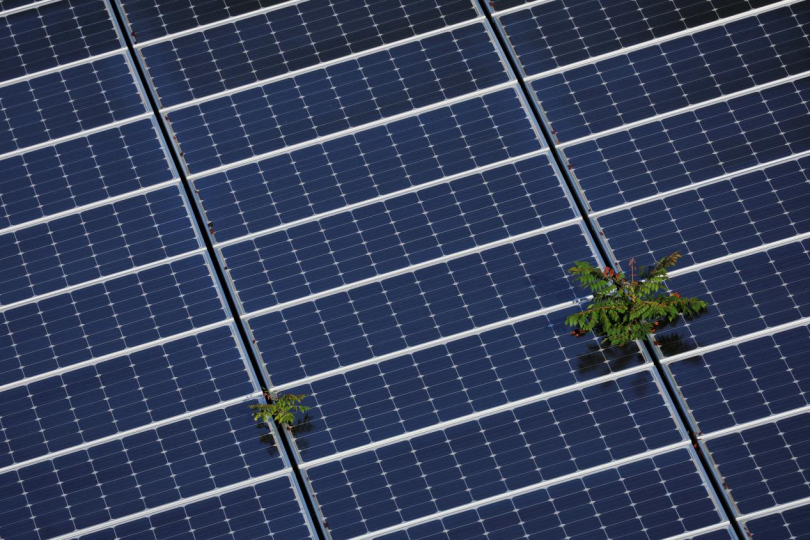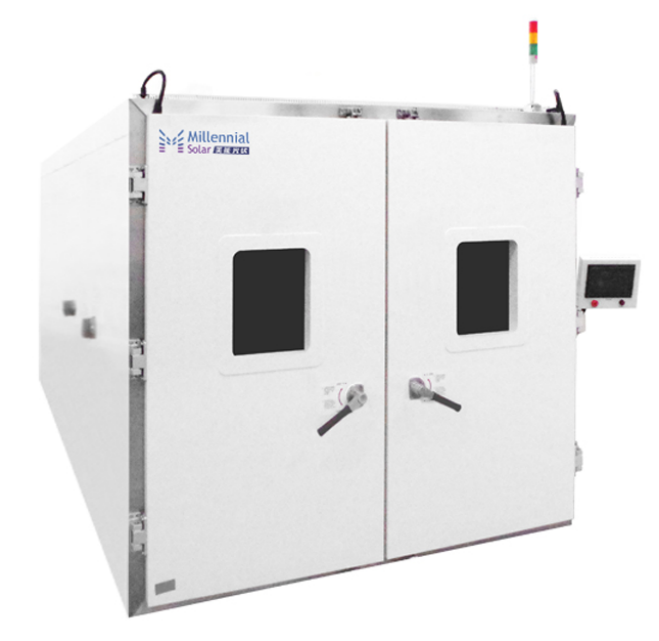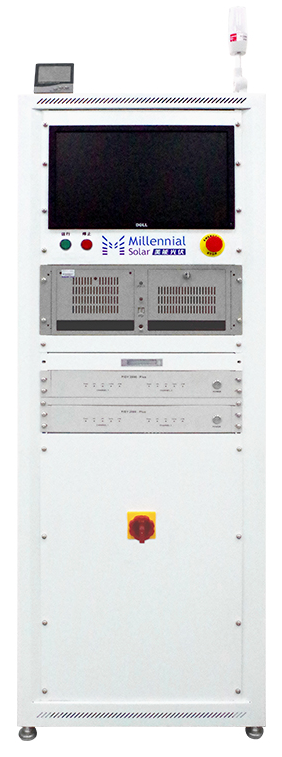
量子效率测试仪
PL/EL一体机
Sinton硅片少子寿命测试仪
Sinton硅块少子寿命测试仪
绒面反射率测试仪
3D共聚焦显微镜
在线四探针方阻测试仪
全自动扫描四探针方阻测试仪
在线薄膜厚度测试仪
晶化率测试仪
Horiba显微共焦拉曼光谱仪
傅里叶红外光谱仪
霍尔效应测试仪
分光光度计
全光谱椭偏仪
Horiba椭圆偏振光谱仪
TLM接触电阻率测试仪
超景深显微镜
网版智能影像测量仪
全自动影像测量仪
卧式拉力机
电池片稳态光衰老化试验箱
电池片紫外老化试验箱
电池片拉脱力综合测试仪
外观检验台
湿漏电测试系统
组件实验室EL测试仪
紫外老化试验箱
稳态光衰老化试验箱
电流连续性监测系统
PID测试系统
旁路二极管测试系统
LeTID测试系统
反向电流过载系统
脉冲电压测试系统
绝缘耐压测试仪
接地连续性测试仪
绝缘耐压接地测试仪
湿热环境试验箱
湿冻环境试验箱
热循环试验箱
动态机械载荷测试机
静态机械载荷测试机
冰雹冲击试验机
引出端强度试验机
霰弹冲击试验机
抗划伤(切割)测试机
剥离试验机
万能材料试验机(单臂)
万能材料试验机(双臂)
光伏玻璃透过率测试仪
醋酸测试试验箱
交联度测试系统
二极管接线盒综合测试仪
落球冲击试验机
半自动四探针
全自动探针式台阶仪
多通道太阳能MPPT系统
Horiba稳瞬态荧光光谱仪
大面积钙钛矿方阻椭偏二合一测试仪
大面积钙钛矿影像显微二合一监测站
钙钛矿P1激光划线测试仪
钙钛矿在线PL测试仪
钙钛矿在线方阻测试仪
钙钛矿在线膜厚测试仪
钙钛矿工艺检测工作站
手持式IV测试仪
便携式EL测试仪
手持热成像测试仪
户外组件多通道测试系统
光伏逆变器电能质量测试仪
无人机EL检测仪
IV测试仪
IVEL分选机
美能光伏科普 | 如何避免光伏组件的PID效应?
日期:2023-09-28浏览量:330
随着光伏组件市场产量率的不断提升,光伏组件中太阳能电池的质量要求也随着其产量率的提升而与日俱增,但由于太阳能电池板常常会因为PID效应而导致其表面的钝化情况恶化,从而致使电池片的组件功率的衰减。「美能光伏」为使组件厂商更快捷且精确的观测到这一现象,推出了美能高温高湿试验箱,可高效检测出光伏组件中的PID效应现象。本期「美能光伏」将给您介绍如何尽量避免光伏组件的PID效应!

![]()
什么是PID效应
PID效应又称电势诱导衰减现象,当组件处于负偏压状态下,在外界因素影响下,太阳能电池和金属接地点(一般是通过铝边框)之间会有漏电流通过,封装材料EVA胶膜、背板、玻璃、铝边框容易成为漏电流通道,此时玻璃中的钠离子会进行迁移,透过封装材料之后聚集在电池的表面,形成反向电场,造成局部电池失效,导致组件功率大幅度衰减,这种现象被称为PID效应。
![]()
如何避免PID效应PID的活跃程度与众多因素有关,其中导致PID效应的包括其光伏组件的潮湿程度、组件表面的导电性、酸碱性以及含金属离子的污染物的聚集量,为了更好的提升光伏组件的性能和效率,使其在应用过程中的实用性达到最佳,就必须尽量避免PID效应,目前避免PID效应可通过多种途径。

● 可通过提高EVA胶膜的绝缘性能,目前主要采用高体电阻率的EVA胶膜作为封装材料,或是运用电阻率更高的POE作为封装材料,从而以更优异的性能抑制PID效应。
● 还可通过改变PECVD所制备的ITO薄膜的膜厚和折射率来避免PID效应现象。
● 在实际的应用和研究中,接近逆变器负极的组件,组件所承受的负偏压相对较高,PID效应就会显得更加明显;但如若将组件阵列的负极输出端接地,就可有效的抑制PID效应。
● 还可采用不含钠离子的石英玻璃来代替钠钙玻璃,从而抑制PID效应,但由于这在工艺上有很大的难度,而且石英玻璃成本也相对较为昂贵,在工业生产上大批量应用就显得不太实际。
![]()
美能高温高湿环境试验箱

商务联系:张经理 400-008-6690
太阳能组件应用过程中会经受各种严酷天气的考研。其中组件承受高温、高湿,长期湿气渗透的能力等各项性能需要评估。DH环境模拟试验,为了验证评估组件或材料的可靠性,并通过热疲劳诱导失效模式,早起识别任何制造缺陷。
● 提供IEC61215 - MQT13;IEC61730 - MST53解决方案
● 温度波动±0.5℃、湿度波动可达±2.0%RH
● 可进行高低温交互试验、并持续运行
● 保持1000h以上超高稳定性
● 实现多段温度编程、精度高、可靠性好
![]()
美能PID效应测试仪

商务联系:张经理 400-008-6690
「美能光伏」生产的美能PID效应测试仪,可搭配高温高湿试验箱来检测当太阳能组件经受高温高湿等恶劣环境后出现的功率降低、绝缘性差、脱层等现象,并精确计算出漏电参数,以判断光伏组件是否符合质量标准。
● 可实时监控电压、漏电数据等
● 电压范围可达-2000~2000V、电压精度在±0.5%FS
● 电流范围在-1000μA~1000μA、电流精度达±0.5%FS
即使在当今光伏组件技术不断发展的形势下,PID效应也依然存在。但随着光伏行业的日新月异,相信在不久的将来,PID效应问题将会得到妥善处理。「美能光伏」生产的美能高温高湿试验箱,凭借其优秀的检测性能,不断为光伏组件供应商提供合理的PID测试解决方案,给予客户高效服务!









































































